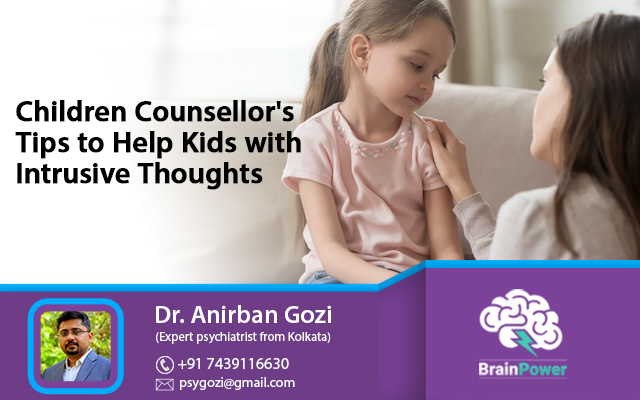Introduction
Imagine an encounter with an intruder who does not belong in your house but slithers its way into and refuses to leave your side. It whispers in your ears irrational afterthoughts and tries to lure you into believing them.
An intrusive thought is like an intruder who refuses to leave, says Dr Anirban Gozi, a children counsellor in Newtown. These thoughts pop out of the blue, comes back frequently, upset mood and, if not addressed the right way, can cause mental health issues.
Intrusive Thoughts in Children
Therapists address intrusive thoughts as ego-dystonic. It means that a child who has intrusive thoughts disagrees with them and feels they do not belong to them.
Intrusive thoughts may include imagery of violence, sex, or ideas that may feel “wrong” to a child. Other times, the thoughts may consist of worst-case scenarios that might come up repeatedly. These thoughts are not something that kids would usually choose to think about, and they’re often the opposite of what a child would do or hope to happen.
Kids who suffer from intrusive thoughts may feel anxious, distressed, or ashamed. They may not comprehend the reasons behind the ideas and may dread having more and try to avoid them. This can be damaging to their mental health.
3 Ways to Help Kids with Intrusive Thoughts
Dr Anirban Gozi, a pediatric psychologist in North Kolkata, lists three ways in which you can help a child with intrusive thoughts:
Normalise intrusive thoughts
Intrusive thoughts are common. A study found that about 94% of people experience intrusive thoughts. However, despite such prevalence, we do not tend to bring up such thoughts in our day to day conversation as they are disturbing. This is why children who experience intrusive thoughts may feel isolated and alone as they do not hear adults speaking about such thoughts.
Therefore, upon noticing symptoms of disturbing thoughts in their child, parents must communicate with them and explain that intrusive thoughts are normal. Through “disturbing or bad thoughts” the brain shows us danger signs. However, the brain is not always correct.
Teaching children about the commonality of such “bad thoughts” would reduce their fear and shame and make them feel normal.
Teach them the difference between thinking and doing
Thoughts hold more power over children than in adults. Children’s thoughts have magical characteristics, which they believe to be true and they often think that their ideas or opinions can cause things to happen in the world. With such belief in magical thinking, children who experience intrusive thoughts may feel guilty or afraid of causing something terrible to happen.
Therefore, it is essential to help children understand that their thoughts do not cause things to happen and bad thoughts do not make them bad people. “It is the choices and actions that make us who we are.”
Help children understand their thoughts and analyse why they feel the way they do. If they think angry or scary thoughts about a person, assure them that their thoughts alone cannot hurt them or cause something wrong to happen. There is a difference between thinking and doing.
Help the child label and accept intrusive thoughts.
“Name it and tame it.” The simple act of labelling thoughts and feelings can make children feel better. The reason is, naming something requires a child to take a step back and observe their feelings and opinions rather than being absorbed and overwhelmed by them.
Calling out intrusive thoughts is also a helpful reminder that they are common and harmless.
Teach the child the following phrases next time an intrusive thought strike:
- “My brain is giving me garbage thoughts again.”
- “I’m having an intrusive thought.”
- “This is one of those thoughts I don’t need to listen to.”
Accepting intrusive thoughts can reduce their recurrence.
Conclusion
Sometimes, a child’s intrusive thoughts may grow so big and overwhelming that the strategies mentioned above prove insufficient to tame them. In such cases, consulting a therapist can help.
Visit Dr Anirban Gozi, a child psychiatrist / children’s counsellor in Newtown. He assists with Cognitive Behavioural Therapy (CBT) and other related therapies along with proper medications if needed, which has been proven to help children cope with intrusive thoughts and anxiety.

